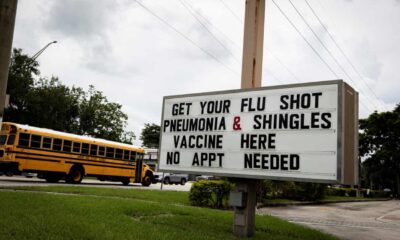Lifestyle
Central Florida Sees Sharp Decline in Childhood Vaccination Rates

Vaccination rates for kindergarteners in Central Florida have reached alarming lows, with Orange County reporting its lowest levels in two decades. According to the Florida Department of Health, the percentage of pupils entering kindergarten fully vaccinated has significantly decreased across the state, but Orange County’s decline stands out. This year, only about 85% of kindergarteners in Orange County received vaccinations against infectious diseases such as measles and polio, a stark drop from nearly 94% in 2016.
The situation is concerning, as vaccination rates in all Central Florida counties are below the critical threshold of 95%, often referred to as herd immunity. Achieving this level is essential to prevent clusters of disease outbreaks. Lake and Osceola counties recorded vaccination rates of approximately 86%, while Seminole County fared slightly better at around 90%. These figures reflect a downward trend, with all counties reporting lower vaccination rates compared to a decade ago.
Michael Muszynski, a pediatric infectious disease expert and professor emeritus at Florida State University, expressed grave concerns regarding the implications of these declining rates. “Once you get down in the 80s, like we are, we’re going to have an outbreak in Florida in the near future. Because that is really bad,” he stated. This year, just under 89% of kindergarteners statewide were fully immunized, significantly lower than the national average of 93%. The decline in vaccination rates has been consistent since 2020, a trend that many attribute to the erosion of trust in mainstream medical advice during the COVID-19 pandemic.
Florida law mandates that students receive vaccinations for several diseases, including diphtheria, tetanus, pertussis, polio, measles, mumps, rubella, hepatitis B, and chickenpox before enrolling in school. Notably, the law also allows for medical or religious exemptions. Obtaining a religious exemption in Florida is relatively straightforward, as parents need only to submit a form to the health department. The rules state that such exemptions “must be issued upon request,” without soliciting additional information from parents or guardians.
Social media platforms have become channels for parents who are hesitant about vaccines. Many share advice on how to navigate the exemption process and identify pediatricians willing to treat unvaccinated children. One mother from Volusia County recently posted on Facebook, offering to assist others in avoiding vaccinations for their children, stating, “No jab no school is not a thing in Florida. I can help you if you want to avoid vaccines for school and more.”
The rise in the use of religious exemptions is notable. In 2005, approximately 2% of Florida kindergarteners received a vaccine exemption for non-medical reasons. By 2025, that figure had more than doubled, as indicated by data from the National Center for Immunization and Respiratory Diseases. Nationally, the percentage of children with exemptions from required vaccines rose to an all-time high of 3.6% in the 2024-25 school year. In Florida, the exemption rate was nearly double this figure, exceeding 6%, with some counties reporting rates as high as 15%.
The spread of misinformation regarding vaccines is believed to be a contributing factor to the decline in vaccination rates among young children. Florida Surgeon General Joseph Ladapo has raised doubts about mRNA COVID-19 vaccines and has not recommended the measles vaccine to families. Meanwhile, Robert F. Kennedy Jr., a prominent figure in the anti-vaccine movement, has made unfounded claims linking vaccine ingredients to autism. His organization, the Florida Chapter of Children’s Health Defense, actively promotes vaccine misinformation and provides guidance on how to obtain exemptions from vaccination requirements.
The pandemic has significantly impacted public trust in health guidance, according to Muszynski. He emphasized that vaccines represent one of medicine’s greatest achievements, drastically reducing the incidence of severe diseases. “Vaccines greatly reduce the chance of catching or becoming seriously ill from a disease,” he noted. Unfortunately, many people are now unfamiliar with the devastating consequences of diseases that vaccines have nearly eradicated.
As vaccination rates decline, the resurgence of previously eliminated diseases becomes a serious concern. Jennifer Takagishi, a pediatrician in Tampa and vice president of the Florida Chapter of the American Academy of Pediatrics, warned that the decrease in vaccination poses an increased risk of outbreaks. “When the rate is low, we are at an increased risk of some of these diseases we have seen eliminated making a comeback,” she said.
A recent measles outbreak at Manatee Bay Elementary School in Weston serves as a stark reminder of this risk. In February 2024, 33 of the school’s 1,067 students lacked at least one dose of the measles vaccine, resulting in the infection spreading to nine children. “Vaccination declines we saw during the COVID-19 pandemic aren’t rebounding,” Takagishi added, anticipating that the impact of lower immunization rates may take a year or two to manifest in outbreaks.
Nationwide, the Centers for Disease Control and Prevention reported that this year, 462 cases of measles have been documented, up from 77 in 2024. Pertussis, or whooping cough, another vaccine-preventable disease, has also seen a surge, with Florida recording over 1,100 cases in 2025 compared to just 391 in 2019. Young children are particularly vulnerable to this respiratory infection, which can lead to severe complications.
Parents like Jude Bruno, whose son recently started kindergarten in Miami-Dade County, acknowledge the importance of vaccinations. “Yes, give him a shot, because we want what’s best for him,” Bruno, president of the Florida Parent Teacher Association, remarked. The organization is increasingly concerned about the implications of declining vaccination rates, predicting that the trend could lead to further disruptions in schools.
As school officials brace for the upcoming legislative session, Bruno indicated that the Florida PTA plans to advocate more vigorously for addressing vaccination rates. “It’s already dangerously low, and it going any lower will have ripple effects across our school ecosystem,” he noted. The situation in Central Florida underscores the urgent need for renewed efforts to improve vaccination rates and safeguard public health.
-

 Technology5 months ago
Technology5 months agoDiscover the Top 10 Calorie Counting Apps of 2025
-

 Health2 months ago
Health2 months agoBella Hadid Shares Health Update After Treatment for Lyme Disease
-

 Health3 months ago
Health3 months agoErin Bates Shares Recovery Update Following Sepsis Complications
-

 Technology4 months ago
Technology4 months agoDiscover How to Reverse Image Search Using ChatGPT Effortlessly
-

 Technology1 month ago
Technology1 month agoDiscover 2025’s Top GPUs for Exceptional 4K Gaming Performance
-

 Technology2 months ago
Technology2 months agoElectric Moto Influencer Surronster Arrested in Tijuana
-

 Technology5 months ago
Technology5 months agoMeta Initiates $60B AI Data Center Expansion, Starting in Ohio
-

 Technology5 months ago
Technology5 months agoRecovering a Suspended TikTok Account: A Step-by-Step Guide
-

 Health4 months ago
Health4 months agoTested: Rab Firewall Mountain Jacket Survives Harsh Conditions
-

 Lifestyle5 months ago
Lifestyle5 months agoBelton Family Reunites After Daughter Survives Hill Country Floods
-

 Technology4 months ago
Technology4 months agoHarmonic Launches AI Chatbot App to Transform Mathematical Reasoning
-

 Technology3 months ago
Technology3 months agoUncovering the Top Five Most Challenging Motorcycles to Ride



















